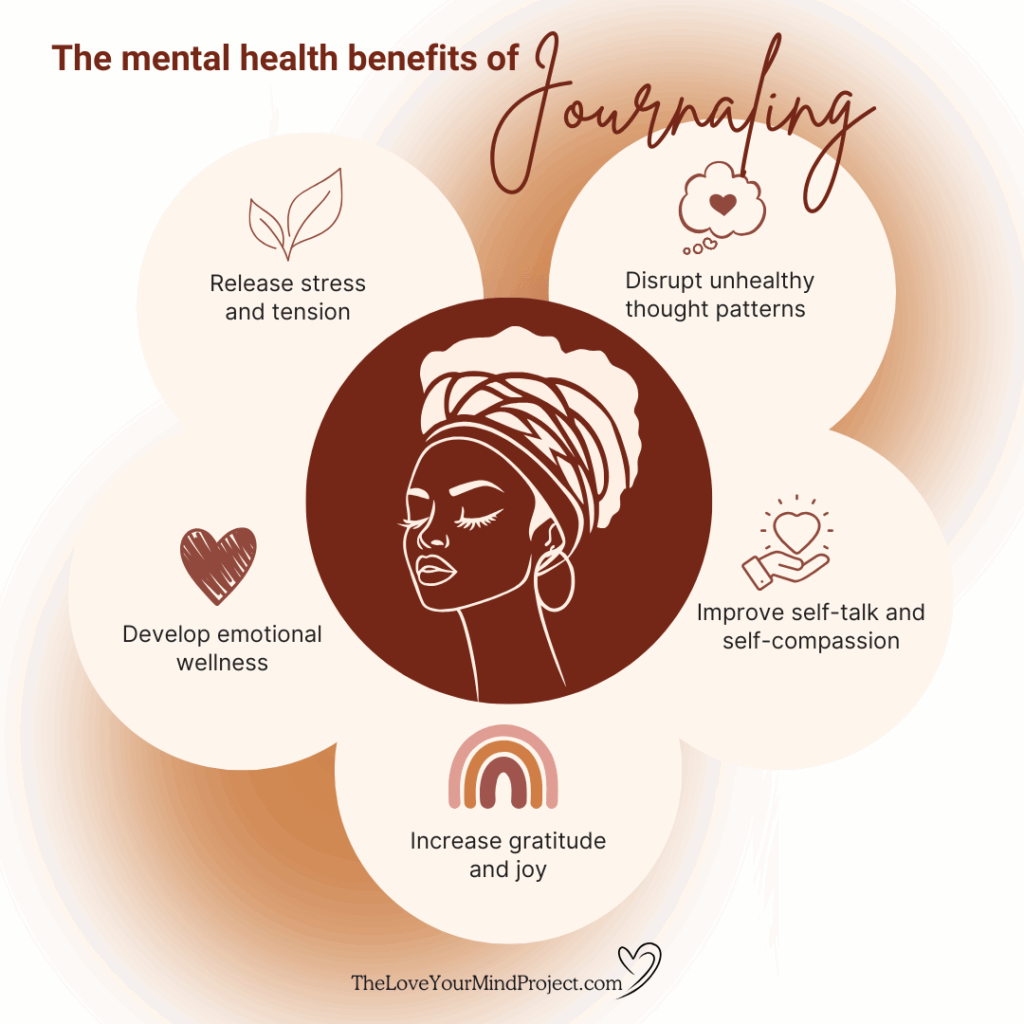- How to recover from burnout: For Black women carrying too much - October 2, 2025
- 50 Black women therapists in 50 states—pioneering healing, representation, and culturally affirming care - September 25, 2025
- How to start a journal—and why it’s powerful for Black women’s mental health - September 18, 2025
Reflect, release, and recoup—just a few of the life-changing benefits you’ll discover when you learn how to start a journal for mental wellness.

For the Black woman who feels pressure to hold it all together or keep quiet not to burden others, a journal can be the one place to release it all.
It’s not self-indulgent or immature. Journaling is affirming. It validates that you’re human and allowed to have needs, feel pain, and process emotions. And it’s proven to improve your mental health.
This guide walks you through how to start a journal to build emotional resilience, manage stress, and protect your peace.
>> Have you subscribed? Sign up for weekly encouragement in your inbox!
What's in this article?
What is journaling?
Journaling is the simple act of capturing your thoughts or feelings. At its core, it helps you express your emotions—a skill essential to mental wellness. By acknowledging and naming how you feel, you can better understand how your experiences impact you, which can help you identify your unmet needs.
How journaling can boost mental health (and more)
Studies show that journaling may improve mental health conditions like anxiety, post-traumatic stress disorder (PTSD), and depression.1 Research also points to physical benefits, like supporting the immune system, lowering blood pressure, and reducing symptoms of many chronic illnesses.2,3
Here are just a few ways journaling can boost your mental health.4,5
- Releases stress and tension.
- Disrupts obsessive or ruminating thought patterns.
- Develops greater emotional awareness (and decreases overwhelm).
- Increases gratitude and joy.
- Improves self-compassion and positive self-talk.
For Black women, journaling could be one of the few times we lay down the “strong Black woman” cape and give ourselves permission to be honest about our emotional needs.
>> MORE: What it really means to live your best life—tips from Black women therapists
Different types of journaling (find the style that fits you)
There are no hard-and-fast rules when it comes to journaling. You can write a lot or a little, or skip writing altogether by using drawings or collages. The best journal is the one that fits your personality and lifestyle.
Here are a few journal types and styles to consider:
- Free-writing journal: Write or type whatever comes to mind.
- Bullet journal: Jot down thoughts or feelings in shorthand, like a list—perfect if you’re pressed for time.
- Creative journal: Doodles, sketches, collages, or even poetry can help creatives process their experiences.
- Audio journal: Prefer not to write? Record your notes instead.
- Gratitude journal: List what you’re thankful for, with as much detail as possible.
- Affirmation journal: Write down those undeniable truths about who you are to build self-esteem and quiet negative self-talk.
- Prompt journal: Choose a thoughtful question to guide your reflection.

How to start a journal for mental wellness
Keep the process simple, focusing on what helps you acknowledge, release, and refuel. Here are a few tips you can try.
Set aside dedicated “journal time”
Try to commit to a set time each day if you want to build a routine. You don’t need hours—even a few minutes could be enough to set your focus in the morning or release stress before bed.
Make it a no-judgment zone
Share your feelings freely without judgment. With time, you’ll see how fleeting emotions can be and how even the simple act of naming them can reduce stress and overwhelm.
Write, doodle, or draw—it all counts
Your journal doesn’t have to be filled with long entries. One word, a brief sketch, or a bulleted list could be enough to interrupt and quiet obstrusive thoughts.
Use journal prompts to get started
If you don’t know where to start or find yourself staring at a blank page, you can start with a prompt, such as:
- Today, I feel __.
- Something I want to let go of is __.
- One thing I’m grateful for __.
Using a prompt can be great practice for re-focusing your mind when it feels overcome by worries or fears.
>> MORE: Affirmations for Black women who need help knowing they are enough
Don’t hold back—let the real feelings out
All of your emotions are valid, even the most difficult ones. Write about the heartbreak, the disappointment, the anger, and the fear. You’re not wallowing—you’re processing pain so you can release it.
Celebrate the positives, too
Take note of your progress and wins, big or small. It’s like exercising a muscle. With time, you’ll see your resilience in every situation and notice gratitude more easily.
Go with the flow, don’t force it
Some days you may fill pages. Other days, you won’t have much to say. If nothing’s coming to you, don’t force it. A journal doesn’t have to be another item on your to-do list.
Journaling is just the beginning of your wellness journey
Your journal can be a powerful tool for emotional expression and healing. But it’s more impactful when combined with other healthy habits. When you pair journaling with mindfulness, nutrition-rich foods, regular exercise, and relationships, including therapy, you’re truly making space to support your full, authentic self.6
This can be a game-changer for Black women learning to put their emotional needs first. And, yes, it is actually okay to put your needs first. Your lived experiences matter, and you’re allowed to create spaces that honor them.
>> Want more? Read this Black women’s guide to mental health
How to start a journal for mental wellness FAQs
How does journaling help with mental health?
Journaling is an outlet to process emotions. This can reduce stress, build self-awareness, and increase gratitude. Studies show that journaling can also improve symptoms of anxiety, PTSD, and depression.1
How do you get started journaling as a beginner?
Start small. Choose a notebook or app you like and set aside a few minutes to write whatever you feel, without judgment. You can use journal prompts if you don’t know what to write about.
Do I have to journal every day?
Not at all. Some people enjoy a daily routine, but you can still benefit from writing weekly, monthly, or whenever you feel the need to share. The key is finding what works for you.
References
- Sohal, M., Singh, P., Dhillon, B. S., & Gill, H. S. (2022). Efficacy of journaling in the management of mental illness: a systematic review and meta-analysis. Family Medicine and Community Health, 10(1), e001154–e001154. https://doi.org/10.1136/fmch-2021-001154 ↩︎
- VA.gov | Veterans Affairs. (2016). Va.gov. https://www.va.gov/WHOLEHEALTHLIBRARY/tools/therapeutic-journaling.asp ↩︎
- McGuire, K. M. B., Greenberg, M. A., & Gevirtz, R. (2005). Autonomic Effects of Expressive Writing in Individuals with Elevated Blood Pressure. Journal of Health Psychology, 10(2), 197–209. https://doi.org/10.1177/1359105305049767 ↩︎
- Sutton, J. (2018, May 14). 5 Benefits of Journaling for Mental Health. PositivePsychology.com. https://positivepsychology.com/benefits-of-journaling/
↩︎ - Journaling for Mental Health and Wellness. (2024, July 2). HelpGuide.org. https://www.helpguide.org/mental-health/wellbeing/journaling-for-mental-health-and-wellness ↩︎
- 31 Tips to Boost Your Mental Health | Mental Health America. (2025, April 28). Mental Health America. https://mhanational.org/resources/31-tips-to-boost-your-mental-health/ ↩︎
